【海归求职】面试投行的十大最经典的Technical问题
投资银行面试题目

投资银行面试题目一、自我介绍在投资银行面试中,第一个问题通常是要求进行自我介绍。
这是一个展示个人能力与经历的机会,同时也是给面试官留下深刻印象的重要环节。
以下是我在投资银行面试中的自我介绍:我是XXX(你的名字),非常荣幸能够参与XXX(公司名)的面试。
我拥有XXX(相关背景)的学士学位,并在XXX(相关经历)中积累了丰富的实践经验。
在过去的XXX(年数)里,我专注于XXX (相关领域)的研究和实践,并通过参与项目和培训不断提升自己的专业能力。
我熟练掌握XXX(相关技能),并具备团队合作和解决问题的能力。
我对投资银行行业充满热情,并希望能够加入XXX(公司名)的团队,为公司的发展做出贡献。
二、为什么选择投资银行这个问题旨在考察面试者对投资银行行业的理解和认可程度。
以下是我对于为什么选择投资银行的回答:我选择投资银行是因为对于金融市场的热爱和个人追求。
投资银行是金融市场中的核心力量,能够参与并推动重大交易和项目的完成。
我相信,通过在投资银行工作,我将有机会接触到各种复杂的金融产品和财务模型,同时也能够锻炼自己的团队合作和解决问题的能力。
投资银行行业具有较高的挑战性和竞争性,但同时也给予了优秀人才很多发展机会。
我希望能够在这个行业中实现自己的职业目标,并为金融市场的发展做出贡献。
三、解释并分析一个财务报表这是一个常见的投资银行面试题目,要求应聘者解释并分析一个财务报表。
以下是我对该题目的回答:首先,我会选择公司的年度财务报表进行分析,以获取公司的整体财务状况。
然后,我会从财务报表中提取重要的数据和指标,例如营业收入、净利润、总资产、负债情况等。
接下来,我会比较不同年度的数据,观察公司的财务状况是否有明显变化。
在分析财务报表时,我会关注以下几个方面:1. 盈利能力:通过分析净利润、毛利率和净利润率等指标来评估公司的盈利能力。
2. 偿债能力:通过分析总资产、负债情况和债务水平等指标来评估公司的偿债能力。
【海归招聘】面试真经
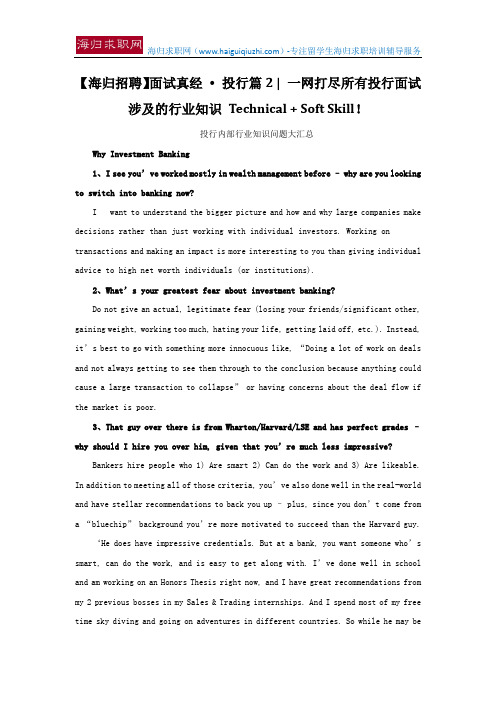
【海归招聘】面试真经• 投行篇2 | 一网打尽所有投行面试涉及的行业知识Technical + Soft Skill!投行内部行业知识问题大汇总Why Investment Banking1、I see you’ve worked mostly in wealth management before –why are you looking to switch into banking now?I want to understand the bigger picture and how and why large companies make decisions rather than just working with individual investors. Working on transactions and making an impact is more interesting to you than giving individual advice to high net worth individuals (or institutions).2、What’s your greatest fear about investment banking?Do not give an actual, legitimate fear (losing your friends/significant other, gaining weight, working too much, hating your life, getting laid off, etc.). Instead, it’s best to go with something more innocuous like, “Doing a lot of work on deals and not always getting to see them through to the conclusion because anything could cause a large transaction to collapse” or having concerns about the deal f low if the market is poor.3、That guy over there is from Wharton/Harvard/LSE and has perfect grades –why should I hire you over him, given that you’re much less impressive?Bankers hire people who 1) Are smart 2) Can do the work and 3) Are likeable. In ad dition to meeting all of those criteria, you’ve also done well in the real-world and have stellar recommendations to back you up –plus, since you don’t come from a “bluechip” background you’re more motivated to succeed than the Harvard guy.‘He does have impressive credentials. But at a bank, you want someone who’s smart, can do the work, and is easy to get along with. I’ve done well in school and am working on an Honors Thesis right now, and I have great recommendations from my 2 previous bosses in my Sales & Trading internships. And I spend most of my free time sky diving and going on adventures in different countries. So while he may bequalified on paper, in banking it all comes down to real-world experience and what kind of camaraderie you have with ev eryone. I’m confident that I excel in both of those areas –and since I’m not from a privileged background, I’m even more motivated to succeed than someone who is.’Understanding Investment Banking1、Can you tell me about the different product and industry groups at our bank?This one is bank-dependent and will differ for boutiques, middle-market firms and bulge brackets – so you need to research it before your interview.Common product groups include Mergers & Acquisitions (M&A), Leveraged Finance (LevFin) and Restructuring; you could also consider Equity Capital Markets and Debt Capital Markets “product groups” but that one is debatable.Common industry groups include Healthcare, Retail, Industrials, Energy, Natural Resources, Financial Institutions, Gaming, Real Estate and Technology, Media & Telecom (TMT).Not all banks are structured this way – Goldman Sachs, for example, does not have product groups and instead handles all types of deals in its industry groups. A lot of boutiques focus only on M&A and/or Restructuring and ones that are small enough are not even split into industry groups.2、What’s in a pitch book?It depends on the type of deal the bank is pitching for, but the most common structure is:1.Bank “credentials” (similar deals they’ve done to “prove” their expertise).2.Summary of a company’s options (“strategic alternatives” inbanker-speak).3.Valuation and appropriate financial models (for example, if you’re pitching foran IPO you might show where the IPO proceeds would go).4.Potential acquisition targets (buy-side M&A deal) or potential buyers (sell-sideM&A deal). This is not applicable for equity/debt deals.5.Summary and key recommendations.Discussing Transaction Experience1、Walk me through one of the deals listed on your resumeExample 1 (A sell-side M&A deal):One of the deals I worked on was the sale of a $1 billion market cap consumer retail company. They specialized in food and beverages and sold to the US and European markets. Their revenue was around $800 million with $200 million EBITDA, growing at around 5% per year. They were interested in selling because of a string of recent acquisitions in their market, and felt they could get a premium valuation. They engaged us to run a broad sell-side process with financial and strategic buyers.Example 2 (IPO):One deal I worked on was the $200 million IPO of a Chinese Internet company on the Hong Kong stock exchange. They had revenue of around $50 million, EBITDA of $10 million, and were growing very quickly, around 50% per year. They were going public to raise funds so that they could expand beyond China and get into other markets, and we were the lead underwriter on the deal.Brain Teaser Questions1、What is the angle formed by the hands of the clock when it is 1:45?142.5 degrees. If we just think of the clock hour hand at 1 and the minute hand at the 45 position (near 9 o’clock), that is 120 degrees since they are 4 “numbers” apart, and each number on the clock represents 30 degrees (360/12).However, recall that the hour hand has already moved by the time the minute hand has reached the 45 position –it is now closer to 2 o’clock. 45 represent ¾ of an hour, so the hour hand will have moved ¾ of 30 degrees, or 22.5 degrees. If we add them together, we see that 120 + 22.5 = 142.52、You have a hose along with a 3 liter bucket and a 5 liter bucket. How do you get exactly 4 liters of water?First, fill the 3 liter bucket and pour it into the 5 liter one.Then, re-fill the 3 liter bucket and pour it into the 5 liter bucket until it’s full – that leaves 1 liter in the 3 liter bucket and 5 in the 5 liter bucket.Then, pour out the 5 liter bucket so nothing is left and pour the 1 liter of water from the 3 liter bucket into the 5 liter bucket. Finally, fill the 3 literbucket completely and pour it into the 5 liter bucket – since it already has 1 liter of water, you’ll get exactly 4 liters.。
【海归人才网】无死角投行校园面试攻略:秘籍在手,投行我有!
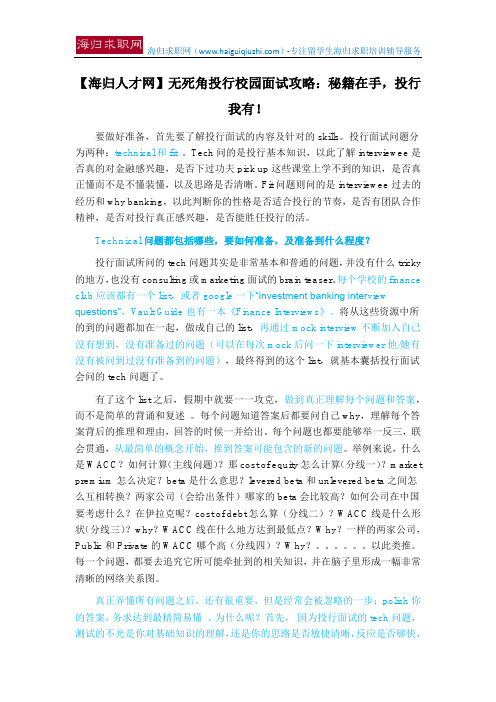
【海归人才网】无死角投行校园面试攻略:秘籍在手,投行我有!要做好准备,首先要了解投行面试的内容及针对的skills。
投行面试问题分为两种:technical和fit 。
Tech问的是投行基本知识,以此了解interviewee是否真的对金融感兴趣,是否下过功夫pick up这些课堂上学不到的知识,是否真正懂而不是不懂装懂,以及思路是否清晰。
Fit问题则问的是interviewee过去的经历和why banking,以此判断你的性格是否适合投行的节奏,是否有团队合作精神,是否对投行真正感兴趣,是否能胜任投行的活。
Technical问题都包括哪些,要如何准备,及准备到什么程度?投行面试所问的tech问题其实是非常基本和普通的问题,并没有什么tricky 的地方,也没有consulting或marketing面试的brain teaser。
每个学校的finance club应该都有一个list,或者google一下“investment banking inter view questions”,Vault Guide也有一本《Finance Interviews》。
将从这些资源中所的到的问题都加在一起,做成自己的list,再通过mock interview不断加入自己没有想到,没有准备过的问题(可以在每次mock后问一下interviewer他/她有没有被问到过没有准备到的问题),最终得到的这个list,就基本囊括投行面试会问的tech问题了。
有了这个list之后,假期中就要一一攻克,做到真正理解每个问题和答案,而不是简单的背诵和复述。
每个问题知道答案后都要问自己why,理解每个答案背后的推理和理由,回答的时候一并给出。
每个问题也都要能够举一反三,联会贯通,从最简单的概念开始,推到答案可能包含的新的问题。
举例来说,什么是WACC?如何计算(主线问题)?那cost of equity怎么计算(分线一)?market premium怎么决定?beta是什么意思?levered beta和unlevered beta之间怎么互相转换?两家公司(会给出条件)哪家的beta会比较高?如何公司在中国要考虑什么?在伊拉克呢?cost of debt怎么算(分线二)?WACC线是什么形状(分线三)?why?WACC线在什么地方达到最低点?Why?一样的两家公司,Public和Private的WACC哪个高(分线四)?Why?。
【海外人才招聘会】投行的面试问题清单
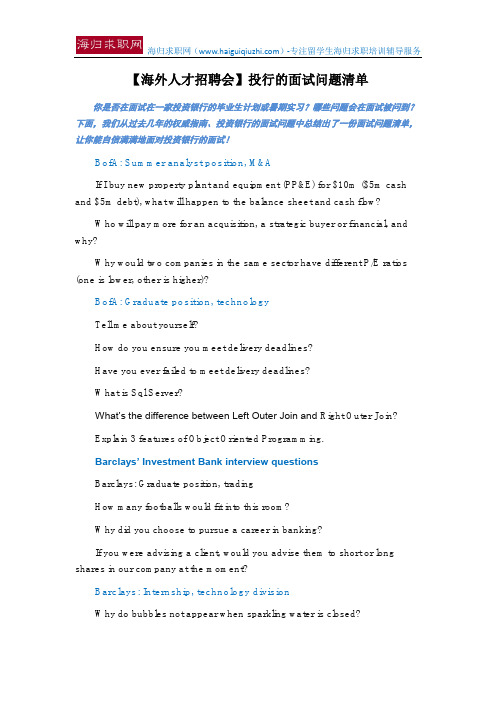
【海外人才招聘会】投行的面试问题清单你是否在面试在一家投资银行的毕业生计划或暑期实习?哪些问题会在面试被问到?下面,我们从过去几年的权威指南、投资银行的面试问题中总结出了一份面试问题清单,让你能自信满满地面对投资银行的面试!BofA: Summer analyst position, M&AIf I buy new property plant and equipment (PP&E) for $10m ($5m cash and $5m debt), what will happen to the balance sheet and cash flow?Who will pay more for an acquisition, a strategic buyer or financial, and why?Why would two companies in the same sector have different P/E ratios (one is lower, other is higher)?BofA: Graduate position, technologyTell me about yourself?How do you ensure you meet delivery deadlines?Have you ever failed to meet delivery deadlines?What is Sql Server?What’s the difference between Left Outer Join and R ight Outer Join?Explain 3 features of Object Oriented Programming.Barclays’ Investment Bank interview questionsBarclays: Graduate position, tradingHow many footballs would fit into this room?Why did you choose to pursue a career in banking?If you were advising a client, would you advise them to short or long shares in our company at the moment?Barclays: Internship, technology divisionWhy do bubbles not appear when sparkling water is closed?Why, in this glass do the bubbles in the water sit at th e bottom?”Tell me about your personal morals, what p*sses you off?Barclays: Internship, trading and structuringWhat’s 1/7 expressed as a decimal?There’s a revolver, with two bullets in two chambers that are next to each other, and the rest of the four chambers are empty. The policeman spun the revolver and pulled the trigger at you, nothing happened. Suppose that you don’t want to die, would you prefer the policeman to spin the revolver again before the next shooting or shoot again directly?Suppose I h ave a string and cut it into two pieces, what’s the probability that one piece is at least twice as long as the other piece?So you study mathematics, tell me one the theorem you have learned in Discrete Mathematics [listed in coursework section of CV]?What is VaR? What are its advantages and disadvantages?Barclays: Internship, operationsTell me about Barclays?Tell me a weakness of yours?Explain a time where you coped with working in a ‘difficult’ team environment. i.e. where you didn’t get on with members of your team.Tell me how your previous work experience is beneficial in an investment banking environment.Tell me about a time when you were required to be a leader.Are you able to work with people of varying cultures? If so, explain why.Barclays: Graduate position, IBDHow many lightbulbs are there in the UK?How would you invest £1,000,000?I have 45 socks in a drawer; 10 are blue, 15 are red, 20 are yellow. If I blindly pull out one sock at a time, how many attempts are needed to get a pair?What have you done to prove your leadership skills?Berenberg interview questions:Berenberg: Summer research internship (pre-screening interview)What did the FTSE close at yesterday?You’ve pitched me a buy stock and a sell stock, so what about a hold?Berenberg: Summer research internship (final round)You say that equities are overpriced and due to collapse soon. How can you say that when that’s my job and what I do for a living, day in day out? I’m telling clients to buy certain stocks, are you saying I’m wrong?So you’ve never lived out for uni? How would you survive if I sent you to Hamburg for 2 years?Which daily newspaper do you read? Aside from the FT or WSJ. And why?Berenberg: Graduate position, equity researchWhat can you do with an orange?If you were an animal, which one would you be and why?There is another candidate for the position. Should we interview him and decide who is better or would you prefer we make our hiring decision by flipping a coin?Citigroup interview questionsCitigroup: Summer internship, private bankingIf you had to re-design an orange- what would it look like?Do you think China’s economy will continue to liberalise and by how much further?What is your favourite Microsoft programme and why?Citigroup: Graduate position, IBDHow did you convince a senior member of your team about the effectiveness of an idea you had?What is the most significant recent development in the investment banking industry?Tell me about a time when you were under immense pressure.What do you think will be the emerging trends in consumer banking (yes, someone was asked this in an investment banking interview)?Credit Suisse investment bank interview questionsCredit Suisse: Graduate position, IBDTell us about yourself?Why our bank?Tell us about your strengths?Do you have any examples of times when you used your own initiative?Where do you see yourself in next five years?Credit Suisse: Internship, M&AI have a cube made up of smaller cubes, 10x10x10. If I dip the whole thing in paint, how many cubes will have no paint on them?Are you a Keynesian or a monetarist?I have two frogs and their population doubles in size every second. It takes 60 seconds to fill up a room with frogs. How long does it take to fill up half the room?DC AdvisoryDC Advisory: Internship, FrankfurtHow can you get from FCFF to FCFE?Please create a one pager about a company in one hour.Deutsche Bank interview questionsDeusche Bank: Graduate position, sales and tradingYour client is a hedge fund that requires you to analyse a certain subsector of the FTSE 100 to identify trading strategies based on volatility. How do you approach the analysis?How do you construct an exchange traded fund (ETF) and what factors do you ta ke into consideration when you’re doing so?Do you believe there is a bubble in the bond market?Deutsche Bank: Graduate position, global capital marketsHow would you rate us against our competitors?Wouldn’t you be better suited to working for another or ganisation?What exactly does the word ‘success’ mean to you?Deutsche Bank: Graduate position, riskWould you say that you are a trustworthy person?Do your friends trust you with their secrets?What types of secrets do they share with you?Where do you see yourself in 5 years?Why are man holes round?Are there enough hours in the day?What is the square root of 1?Petrol, or diesel – which is more combustible? Why?Goldman Sachs interview questionsGoldman Sachs: Internship, M&AWalk me through an LBO analysis.What factors can lead to the dilution of EPS in an acquisition?If you are in a business that wants to preserve cash, what type of inventory accounting method would you use (LIFO or FIFO) in a time of rising prices, and why?What is Minority Interest and why do we add it in the Enterprise Value formula?Briefly walk me through a discounted cash flow analysis. (including WACC).Why can’t you use EV/Earnings or Price/EBITDA as valuation metrics?Estimate the value of the tie industry in the UK.What are your best skills? Why would they be applicable?Discuss a deal you have read about recently.Who is the most famous and influential person you would like to meet and why?Why Goldman Sachs?Goldman Sachs: Graduate position, securitiesWhen you heat a sausage in the microwave, the tear is always lengthwise. Why is that?How could you set up a recursive function so that a really smart language / compiler could evaluate the function and never run out of memory?KPMG interview questionsKPMG: Graduate programme, restructuring, FrankfurtWhen a firm has a market share of 50% in Germany and 30% in Europe, what is the market share of the firm in Europe without Germany?You are given 100 million Euro to set up your own bank. Which customer segment would you focus on, and which strategy would you use for that?JPMorgan interview questionsJPMorgan: Summer internship, sales and tradingGive an example of a time you encountered a difficult question whilst working in a groupWhat is the biggest risk you have ever taken in your life?What do you see yourself contributing to this organization, in both the short and long term?JPMorgan: Summer internship, M&AWhy are you looking for an internship in Investment Banking?Why do M&As happen?What are your 3 main strengths?What is your greatest weakness?What motivates you?JPMorgan: Associate interview, M&AYou look at the clock. It’s 3.15pm. What’s the angle between the clock hands?What is the sum of the numbers from one to 100?What is the expected value of a roll of a dice?JPMorgan: Off-cycle internship, FX salesTell me about your educational background.Which are the most important/interesting subjects within FX markets at the moment?If you could pick whichever investment you wanted, were would you put your money today?What do you think a position within FX Sales would entail?Lazard interview questionsLazard: Graduate interview, M&AShould charities be taxed?You’ve been captain of your sports team and are obviously used to being in charge. How will you feel about being at the bottom of the food chain here?Do you agree with the private equity model of buying cheap, cutting costs and selling high?Man Group interview questionsMan: Summer internship, asset managementCan you estimate UK GDP?You’ve have estimated the average salary as £40k. Can you now estimate the largest mortgage an individual can obtain when buying a house. Let’s say the interest rate is 5% on a 20 year mortgage.Calculate the square root of 69Macquarie interview questionsMacquarie: Internship, IBDName me a company you would invest in and why.What are three ways of valuing a company?What’s 456 x 3?Macquarie: Graduate position, IBDHow many weddings are there in Germany in a year?How tall is the Citypoint building?Describe yourself in three words.What is your biggest flaw?Mitsubishi UFJ interview questionsMitsubishi: Graduate position, fixed income tradingWhat are the risks associated with owning a bond?How do you hedge interest rate risk on a bond?How does liquidity affect the bid-offer spread on a bond?Mitsubishi: Graduate position, tradingWhat is the square root of 135?Over the phone I was asked: ‘Which is the main CDS index?’What are the odds of getting two sixes in a row after throwing a fair dice twice?What would you invest in if your holding period was 1year, 3 years and 10 years?Morgan Stanley interview questionsMorgan Stanley: Internship, investment banking division (IBD)What’s the most important: Money, honour, or knowledge?What’s the square root of 341?Why should we not give you the job?Which other investment bank, apart from Morgan Stanley, do you like the most and why?Is political risk in Eastern Europe a serious threat for banks?Briefly walk through a discounted cash flow analysis (including WACC).What is the formula for enterprise value?What is minority interest and why do we add it in the enterprise value formula?Which will place a higher value on the company, equity comparables (trading comps) or M&A comparables (transaction comps) and why?A company makes a $100 cash purchase of equipment on Dec. 31. How does this impact the three statements this year and next year?Tell me how would you value a company? Which are the most used financial tools in this area?Why cannot we use EV/Earnings or Price/EBITDA as valuation metrics?What factors can lead to the dilution of EPS in an acquisition?Why do we subtract cash in the enterprise value formula?Morgan Stanley: Operations, one year placementWhere do you see yourself after this placement (if you g ot it) in 5 years’ time?Name a time you have had to make a tough decision. How did you deal with this?Name a time you have been entrepreneurial. What did you learn from this?Société Générale interview questionsSocGen: Graduate job, project financeWhat is a common ratio used in project finance and how do you calculate it?Why is the DSCR used and what range do you expect it to be in?What is the credit rating for high yield?Why use a project finance structure as opposed to corporate finance?SocGen: Internship, equity structuringWhat the delta of an option when it is at the money (ATM)?What will happen to the price of the option if there is an increase in interest rates?What is the price of an option if the volatility tends towards infinity? And what if the expiry date tends towards infinity?UBS interview questionsUBS: Internship, equity researchHow would you go about valuing a company?Tell me about some time when you’ve had to overcome adversity?How far do you see yourself going in the bank?UBS: Graduate position, wealth managementHow do you price options?If you would have to open an Rep Office, how would you advertise that?When did you show entrepreneurial spirit?What are your current views on the economy and investing?。
投行专业面试问题概要
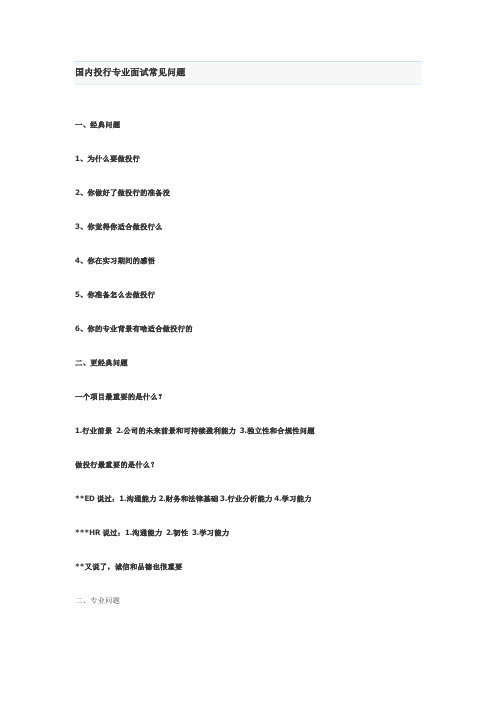
一、经典问题1、为什么要做投行2、你做好了做投行的准备没3、你觉得你适合做投行么4、你在实习期间的感悟5、你准备怎么去做投行6、你的专业背景有啥适合做投行的二、更经典问题一个项目最重要的是什么?1.行业前景2.公司的未来前景和可持续盈利能力3.独立性和合规性问题做投行最重要的是什么?**ED说过:1.沟通能力2.财务和法律基础3.行业分析能力4.学习能力***HR说过:1.沟通能力2.韧性3.学习能力**又说了,诚信和品德也很重要二、专业问题1.实习**时间,你对投行的认识投行的作用:在于综合协调其他中介机构的意见,根据自己的尽职调查结果,为公司上市制定合理的改制方案和上市方案,为推动企业执行;讲个好故事,将拟上市公司从丑小鸭变成美丽的天鹅,卖个好价钱1.投行与pe的区别Pe作为投资者,投行仅是中介机构,确切的讲,投行是为pe等投资者服务的。
具体区别:投资阶段更靠前,投资行业范围更广泛,投资时间更长线,对企业提供的增值服务更贴切,这是PE的价值所在。
2. BS,IS和CFS三个表哪个最重要1.资产负债表:反映企业在某一特定日期财务状况的(静态)会计报表,通过该表了解企业资产(负责)总量及结构、投资者(老板)所拥有的权益。
2.利润表:反映企业在一定会计期间的经营成果的(动态)会计报表,可以一目了然从表中看到经营业绩形成过程,收入来源、成本费用消耗、净利润等。
3.现金流量表:反映企业在一定会计期间现金和现金等价物流入和流出的会计报表。
表中项目从不同角度反映企业业务活动的现金流入与流出,弥补了资产负债表和利润表提供信息的不足(了解净利润的质量)。
以上“三表”既有侧重又相互补充,真正要说出那张表最重要,一定没有唯一的答案,一定是因(使用者立场)人而异。
1.如何从报表看公司财务是否舞弊(报表看公司财务的问题)1.与同类公司或与公司历史比较,毛利率明显异常;2.货币资金和银行贷款同时高企;3.应收账款、存货异常增加;4.估算的应交所得税余额与实际余额相比相差甚远;5.现金净流量长期低于净利润。
国内投行专业面试常见问题

一、经典问题1、为什么要做投行2、你做好了做投行的准备没3、你觉得你适合做投行么4、你在实习期间的感悟5、你准备怎么去做投行6、你的专业背景有啥适合做投行的二、更经典问题一个项目最重要的是什么?1.行业前景2.公司的未来前景和可持续盈利能力3.独立性和合规性问题做投行最重要的是什么?**ED说过:1.沟通能力2.财务和法律基础3.行业分析能力4.学习能力***HR说过:1.沟通能力2.韧性3.学习能力**又说了,诚信和品德也很重要二、专业问题1.实习**时间,你对投行的认识投行的作用:在于综合协调其他中介机构的意见,根据自己的尽职调查结果,为公司上市制定合理的改制方案和上市方案,为推动企业执行;讲个好故事,将拟上市公司从丑小鸭变成美丽的天鹅,卖个好价钱1.投行与pe的区别Pe作为投资者,投行仅是中介机构,确切的讲,投行是为pe等投资者服务的。
具体区别:投资阶段更靠前,投资行业范围更广泛,投资时间更长线,对企业提供的增值服务更贴切,这是PE的价值所在。
2. BS,IS和CFS三个表哪个最重要1.资产负债表:反映企业在某一特定日期财务状况的(静态)会计报表,通过该表了解企业资产(负责)总量及结构、投资者(老板)所拥有的权益。
2.利润表:反映企业在一定会计期间的经营成果的(动态)会计报表,可以一目了然从表中看到经营业绩形成过程,收入来源、成本费用消耗、净利润等。
3.现金流量表:反映企业在一定会计期间现金和现金等价物流入和流出的会计报表。
表中项目从不同角度反映企业业务活动的现金流入与流出,弥补了资产负债表和利润表提供信息的不足(了解净利润的质量)。
以上“三表”既有侧重又相互补充,真正要说出那张表最重要,一定没有唯一的答案,一定是因(使用者立场)人而异。
1.如何从报表看公司财务是否舞弊(报表看公司财务的问题)1.与同类公司或与公司历史比较,毛利率明显异常;2.货币资金和银行贷款同时高企;3.应收账款、存货异常增加;4.估算的应交所得税余额与实际余额相比相差甚远;5.现金净流量长期低于净利润。
【海归求职】面试真经
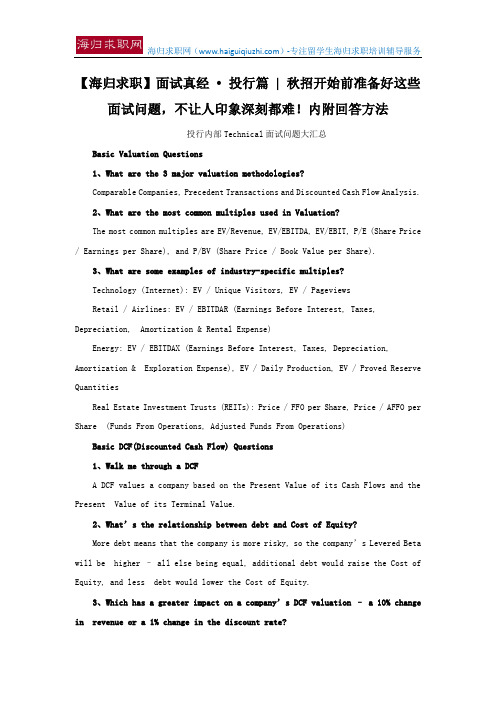
【海归求职】面试真经• 投行篇| 秋招开始前准备好这些面试问题,不让人印象深刻都难!内附回答方法投行内部Technical面试问题大汇总Basic Valuation Questions1、What are the 3 major valuation methodologies?Comparable Companies, Precedent Transactions and Discounted Cash Flow Analysis.2、What are the most common multiples used in Valuation?The most common multiples are EV/Revenue, EV/EBITDA, EV/EBIT, P/E (Share Price / Earnings per Share), and P/BV (Share Price / Book Value per Share).3、What are some examples of industry-specific multiples?Technology (Internet): EV / Unique Visitors, EV / PageviewsRetail / Airlines: EV / EBITDAR (Earnings Before Interest, Taxes, Depreciation, Amortization & Rental Expense)Energy: EV / EBITDAX (Earnings Before Interest, Taxes, Depreciation, Amortization & Exploration Expense), EV / Daily Production, EV / Proved Reserve QuantitiesReal Estate Investment Trusts (REITs): Price / FFO per Share, Price / AFFO per Share (Funds From Operations, Adjusted Funds From Operations)Basic DCF(Discounted Cash Flow) Questions1、Walk me through a DCFA DCF values a company based on the Present Value of its Cash Flows and the Present Value of its Terminal Value.2、What’s the relationship between debt and Cost of Equity?More debt means that the company is more risky, so the company’s Levered Beta will be higher – all else being equal, additional debt would raise the Cost of Equity, and less debt would lower the Cost of Equity.3、Which has a greater impact on a company’s DCF valuation – a 10% change in revenue or a 1% change in the discount rate?You should start by saying, “it depends” but most of the time the 10% difference in revenue will have more of an impact. That change in revenue doesn’t affect only the current year’s revenue, but also the revenue/EBITDA far into the future and even the terminal value.Basic LBO (Leveraged Buyout) Questions1、Walk me through a basic LBO model.Step 1:Making assumptions about the Purchase Price, Debt/Equity ratio, Interest Rate on Debt and other variables; you might also assume something about the company’s operations, such as Revenue Growth or Margins, depending on how much information you have.Step 2: Create a Sources & Uses section, which shows how you financethe transaction and what you use the capital for; this also tells you how much Investor Equity is required.Step 3: Adjust the company’s Balance Sheet for the new Debt and Equity figures, and also add in Goodwill & Other Intangibles on the Assets side to make everything balance.Step 4:Project out the company’s Income Statement, Balance Sheet and Cash Flow Statement, and determine how much debt is paid off each year, based on the available Cash Flow and the required Interest Payments.Step 5:Make assumptions about the exit after several years, usually assuming an EBITDA Exit Multiple, and calculate the return based on how much equity is returned to the firm.2、Why would you use leverage when buying a company?To increase your returns. Any debt you use in an LBO is not “your money” –so if you’re paying $5billion for a company, it’s easier to earn a high return on $2 billion of your own money and $3 billion borrowed from elsewhere versus $3 billion of your own money and $2 billion of borrowed money. A secondary benefit is that the firm also has more capital available to purchase other companies because they have used leverage.3、What variables impact an LBO model the most?Purchase and exit multiples have the biggest impact on the returns of a model. After that, the amount of leverage (debt) used also has a significant impact, followed by operational characteristics such as revenue growth and EBITDA margins.4、What is an “ideal” candidate for an LBO?“Ideal” candidates have stable and predictable cash flows, low-risk businesses, not much need for ongoing investments such as Capital Expenditures, as well as an opportunity for expense reductions to boost their margins. A strong management team also helps, as does a base of assets to use as collateral for debt. The most important part is stable cash flow.5、How do you use an LBO model to value a company, and why do we sometimes say that it sets the “floor valuation” for the company?You use it to value a company by setting a targeted IRR (Internal Rate Return) (for example, 25%) and then back-solving in Excel to determine what purchase price the PE(Private Equity) firm could pay to achieve that IRR.This is sometimes called a “floor valuation” because PE firms almost always pay less for a company than strategic acquirers would.。
投行面试经典问题
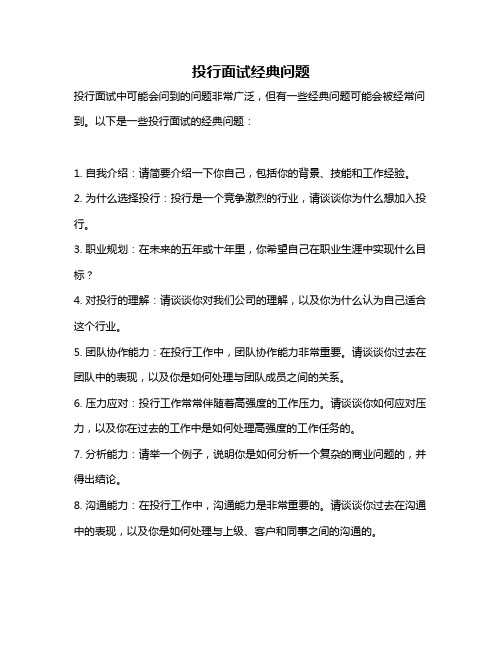
投行面试经典问题
投行面试中可能会问到的问题非常广泛,但有一些经典问题可能会被经常问到。
以下是一些投行面试的经典问题:
1. 自我介绍:请简要介绍一下你自己,包括你的背景、技能和工作经验。
2. 为什么选择投行:投行是一个竞争激烈的行业,请谈谈你为什么想加入投行。
3. 职业规划:在未来的五年或十年里,你希望自己在职业生涯中实现什么目标?
4. 对投行的理解:请谈谈你对我们公司的理解,以及你为什么认为自己适合这个行业。
5. 团队协作能力:在投行工作中,团队协作能力非常重要。
请谈谈你过去在团队中的表现,以及你是如何处理与团队成员之间的关系。
6. 压力应对:投行工作常常伴随着高强度的工作压力。
请谈谈你如何应对压力,以及你在过去的工作中是如何处理高强度的工作任务的。
7. 分析能力:请举一个例子,说明你是如何分析一个复杂的商业问题的,并得出结论。
8. 沟通能力:在投行工作中,沟通能力是非常重要的。
请谈谈你过去在沟通中的表现,以及你是如何处理与上级、客户和同事之间的沟通的。
9. 项目执行:请举一个例子,说明你是如何在项目中起到关键作用的,并帮助项目取得成功。
10. 问题解决能力:请举一个例子,说明你是如何解决一个复杂的商业问题的,并给出解决方案。
这些问题只是一些经典问题,实际上在投行面试中可能会问到更广泛的问题。
在准备面试时,建议做好充分的准备,了解公司的文化、业务和行业,以便更好地回答面试官的问题。
- 1、下载文档前请自行甄别文档内容的完整性,平台不提供额外的编辑、内容补充、找答案等附加服务。
- 2、"仅部分预览"的文档,不可在线预览部分如存在完整性等问题,可反馈申请退款(可完整预览的文档不适用该条件!)。
- 3、如文档侵犯您的权益,请联系客服反馈,我们会尽快为您处理(人工客服工作时间:9:00-18:30)。
【海归求职】面试投行的十大最经典的Technical问题
随着MBA和大学本科的新的一个学期即将要开始,面试这个令人头疼的问题又要摆在大家的面前了。
下面是我们为大家挑选的10个投资银行最经典的技术问题。
1.如何去衡量一个公司的价值
对于这个问题以及变体问题,我们应该用两个最基本的估值方法来回答:第一个是内在价值(Discounted Cash Flow Valuation,以下简称DCF),第二个是相对估值(comparable/multiples valuation)。
内在价值(DCF)
这种方法相对学术化。
DCF要求通过对未来现金流的折现来衡量一个资产的投资价值。
这种方法要求我们预测未来5到20年的现金流,并且根据现在所能得到的信息以及信息的可靠程度,来预测现金流的终值。
然后通过选择合适的投资回报率(对于Unlevered DCF 我们选择加权平均资本成本(WACC),对于Levered DCF我们选择cost of capital,股本成本)对现金流的终值以及预测的现金流进行折现。
在Unlevered DCF中,(这是比较普遍的方法)我们得到的是公司的企业价值。
要扣除净借贷来计算出股票价值。
对于派发股利的股票,我们要计算被摊薄后每股收益来计算每股平均价值
相对估值法(comparable/multiples valuation)
第二个方法中需要选定同一类的公司,一般这类公司与要估值的公司处于同一个行业,有相似的经营环境,成长率,风险,以及投资回报率等。
在现实情况里面,完全相同的公司是不存在的,但是我们要尽量找到相类似的企业从而计算出相对准确的industry multiples,通过计算几个同类型企业的平均multiples,来算出目标企业的价值。
比较常用的乘数有:EV/Rev, EV/EBITDA,P/E,P/Book。
尽管一些行业会比较只强调某几个multiples,另外一些行业会同时使用很多industry multiples。
在你去面试之前,通过学习一个行业或者两个行业(阅读sell-side的研究报告是最好的方法),来准备有可能的会遇到面试问题(告诉我哪个行业你比较有兴趣,以及他们普遍使用的估值乘数是什么)一个不错的方法。
2. 在Unlevered DCF的分析过程中, 什么才是合适的折现率?
由于在Unlevered DCF中自由现金流是pre-debt的(举个栗子帮助你理解这个问题,想象无杠杆现金流(unlevered cash flow)就是无举债的公司的现金流-所以公司没有利息支出,也无法从利息支出中获得税收利益),现金流的成
本涉及到放贷者和资本股本的提供者。
因此,折现率就是向放贷人和股本提供者借钱的成本,即加权平均资本成本。
债务成本(cost of debt)可以从市场上同级风险的其他收益债券而得知,而股本成本(cost of equity)则相对难以估计。
股本成本通常通过资本资产定价模型(即CAPM)模型来预测。
该模型将股本预期收益与它和市场的敏感度联系起来(详细的股本成本计算分析请见WSP的贴现现金流模块)。
3. 哪个通常更高-是债务成本(cost of debt)还是股本成本(costof equity)?
通常股本成本比债务成本更高,因为与借债相关的成本(利息)是税收减免的,也就是产生了税盾效应。
另外,通常股本成本(cost of equity)更高是因为不同于放贷,股本投资者不被保证有固定的收入,并且当公司破产清偿时,他们是最后一批得到索赔的。
4.怎样计算股本成本?
估算股本成本可以使用数种竞争模型,其中业内最常用的是资本资产定价模型(CAPM)。
CAPM建立了证券预期回报与其市场敏感度之间的联系(通常以标准普尔500指数为参考)。
公式如下: 股本成本(re)=无风险利率(rf)+β*市场风险溢价(rm-rf)。
无风险利率
理论上,无风险利率应当反映无违约同期政府债券的到期收益与每个贴现现金流期限之间的关系。
实际上,由于长期债券缺乏流动性,美国公司更常使用美国十年期国债的当期收益率作为无风险利率的参考值。
市场风险溢价
市场风险溢价(rm-rf) 表示以无风险利率投资股票所获得的超额收益。
从业者通常使用历史超额收益法,对标普500指数收益与十年期国债收益的历史差价进行比较。
Beta(β)
Beta用来估算资产的系统风险(不可分散化的风险)。
Beta等于资产预期收益与股市预期收益的协方差,除以股市预期收益的方差。
如果一家公司股本的Beta值等于1.0,即与股市具有同等风险,投资者收益的波动情况与股市相同。
如果股本Beta值为2.0,投资者收益的波动情况为市场的2倍。
5.怎样计算一家公司的Beta值?
由于估算误差,如标准差导致Beta可能取值范围较大,无论通过历史收益计算Beta的原始值,还是计算projected beta,都无法Beta值进行完全准确的衡量,因此推荐使用行业Beta值。
显然,杠杆率不同会导致可比公司的Beta 值失真,因此我们需要对可比公司的Beta值进行去杠杆化
方法如下:
β Unlevered = β(Levered) /[1+ (Debt/Equity) (1-T)]
然后,计算出平均去杠杆化Beta值之后,再根据目标公司的资本结构对该Beta值进行杠杆化:
β Levered = β(Unlevered) x[1+(Debt/Equity) (1-T)]
6.如何计算DCF分析中的unleveredfree cash flows?
Free cash flows = Operatingprofit (EBIT) * (1 –tax rate) +depreciation & amortization – changes in networking capital – capital expenditures
7.选用什么值作为营收倍数(revenue multiple)的分子?
答案就是企业价值(enterprise value)。
这个问题主要测试的是你是否理解资产价值(equity value)和企业价值(enterprise value)的区别,还有他们与营收倍数(revenue multiple)的关系。
Equity value = Enterprisevalue – Net Debt (where net debt = gross debt and debt equivalents – excesscash).
息税前利润(EBIT), 扣除利息、税项及折旧前盈利(EBITD), 无杠杆现金流(unlevered cash flow), 营收倍数(revenue multiples)都应用企业价值(enterprise value)作为分子,因为他们的分母是在测量无杠杆的利润率的方式。
相反,每股收益(EPS),税后现金流(after-tax cash flows),和账面价值(book value of equity)则都用资产价值(equity value)作为分母,因为其价值是杠杆化了的。
8. 如何对一个有负现金流历史的公司进行估值?
当利润率为负时,大多数倍数分析都变得没有意义,这时更好的方法就是DCF。
9. 营收倍数或EBITDA分别应该在什么情况下作为评价公司的方法?
当公司的利润和EBITDA 为负时,计算它的EBITDA倍数也会是没有意义的。
因此,营收倍数(revenue multiple)会提供更多有价值的信息。
10.假设有两家拥有完全相同的收入、发展前景、资产负债比率、资本报酬率和风险的公司,其中A公司的股票以P/E的15倍的价格进行交易,B公司则以P/E的10倍的价格进行交易,你认为哪家公司更值得投资?答案是10 倍p/e的公司,因为理智的投资者都愿意为单股股票付更少的钱。
